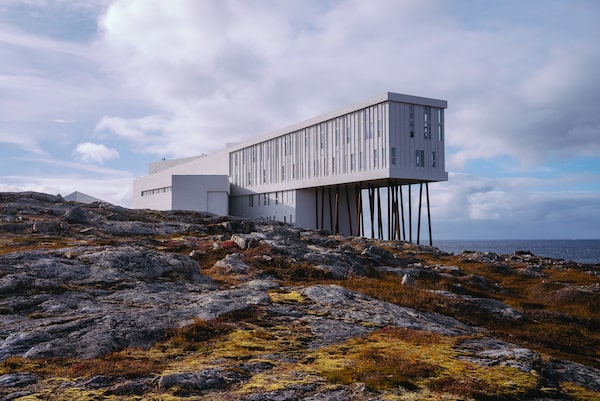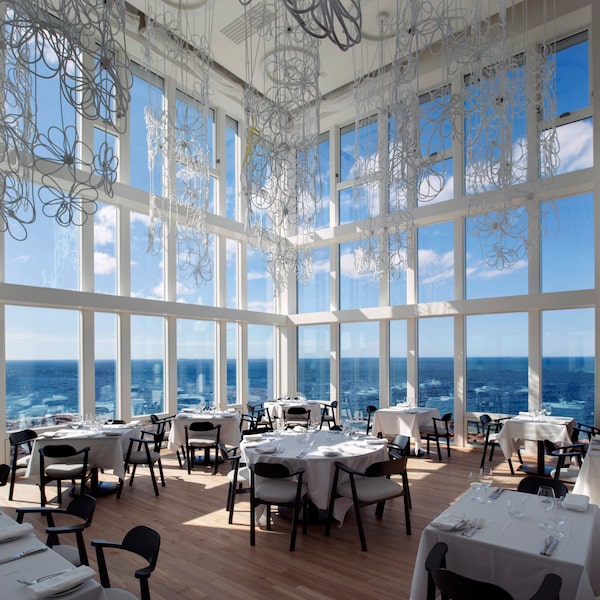
Fogo Island Inn in Newfoundland and Labrador recently announced that its new spring program mostly revolves around sleep.Mike Dell
Newfoundland and Labrador’s Fogo Island Inn has a global reputation for fine cuisine, stunning architecture, beautiful handicrafts and a host of local experiences such as ice fishing, caribou watching and partridgeberry harvesting – all at a premium price. And so, it was perhaps a touch unexpected when the inn recently announced that its new spring program mostly revolves around being unconscious.
The Secrets of Sleep: A Life-Changing Retreat from March 2-6, 2022, will be led by Colleen Carney, director of the Sleep and Depression Laboratory at Ryerson University in Toronto. Daily workshops will include discussions on how to “heal your relationship with sleep,” and encourage both head-clearing and sleepy-time activities such as spending time in the fresh, salty air, journaling in the property’s library, yoga and meditation, relaxing in a rooftop hot tub, or sipping a hot toddy in front of a wood-burning stove. At night, guests can drift off under a nicely weighted handmade quilt to the background noise of waves hitting the rocky shoreline. The program costs $1,100 above the resort’s standard room and board.
“We’ve often heard from guests that they’ve ‘never slept better,’ and pride ourselves in knowing our inn is conducive to relaxation and reflection,” says Amanda Decker-Penton, managing director of Fogo Island Inn. “We know we have a special environment when it comes to quality sleep, and wellness in general. We also understand that natural solutions to sleep problems are highly sought after.”
While “sleep tourism” used to imply bedding down in an exotic location – think ice hotels or safari camps with beds open to the stars – the term has gradually taken on a different connotation: going on vacation for the express purpose of getting some decent sleep.
Conventional hotel rooms have a mixed track record on promoting optimal sleep. Travellers are often presented with a host of intrusions that stand in the way of a good night’s sleep: jetlag, unfamiliar surroundings, nagging concerns impossible to leave back home, and the near inevitability that some element of the room’s technology – whether it’s a remote that supposedly controls the drapes or an old-school clock radio with an alarm preset for 5 a.m. – will make things less zen.
And so, some hotels are now setting out to address those problems head-on. In early 2020, the Ellerman House hotel in Cape Town, South Africa, launched the continent’s first “Sleep Rooms,” which according to a press release were designed by wellness consultant Harry Jameson “to promote rest and relaxation.” All electronics have been removed from the room, and guests are welcomed with a “sleep pack” that contains bath salts, CBD chamomile tea, lavender pillow mist and “stillness body butter” that contains sleep-enhancing ingredients. Guests are guided through a “signature sleep ritual,” purportedly designed to help the body naturally increase melatonin, the hormone associated with the sleep-wake cycle.

The Global Wellness Institute predicts the 'sleep economy' will reach US$585-billion by 2024.Alex Fradkin
These programs could assume greater relevance in an age of pandemic burnout and anxiety, but they aren’t entirely new. More than a decade ago, I attended one in Los Cabos, Mexico, when I went through a bout of sleeplessness that I attributed to a combination of work stress, lousy food choices and drinking too much red wine. Stationed at an oceanside resort, I consulted with a nutritionist, engaged in breathing exercises, indulged in underwater shiatsu massage and had my butler light aromatherapy candles shortly before bedtime. I still woke most nights at 3 a.m. with my mind racing, but I felt oddly serene during my waking hours.
La Carmina, a travel journalist based in Vancouver, found herself chronically overstimulated on a trip to Tokyo in 2017, owing to the neon lights and “all-night Goth clubs.” She checked herself into a Buddhist temple stay in Koyasan, just north of Osaka, so she could finally get some sleep. She stayed in a highly minimalist traditional room, with a natural futon mat and pillow on a tatami floor. Before heading to bed every night, she took a long, hot soak in a deep Japanese-style tub, and then went outside to star gaze and luxuriate in the total silence. “In this tranquil environment, I think I slept 10 to 12 hours straight,” she says.
Hotels have been hawking their own premium mattresses for years, but the next wave of sleep travel is much more detailed and immersive. “Sleep programs originally were associated with wellness retreats as part of the holistic approach to achieving a healthier lifestyle,” says Misty Belles, vice-president of global public relations for Virtuoso, a luxury-travel consortium. “Early on in the pandemic, we saw the trend of celebrity bedtime stories come about, which was a recognition that no one was sleeping easy. Hotels are responding by creating sleep programs that ensure a better night’s sleep during the stay and some go the extra step of providing coaching and techniques that guests can take home with them.”
London’s Cadogan Hotel has a new partnership with local hypnotherapist and sleep expert Malminder Gill. Its “Sleep Concierge” service will include a meditative recording, a pillow menu, a weighted blanket, scented pillow mist and a bedtime tea service. The Rosewood Bermuda has a new three-hour “Sleep Well Journey” for those “wanting to combat the stress, anxiety and insomnia people are experiencing during these uncertain times”; it includes a consultation with a local sleep therapist and acupressure massage. And the Peninsula Chicago recently decided to reinstate its “Sleep Support Therapy” program, a series of massages, nasal oil application and guided savasana – the final resting pose in yoga that’s also known as corpse pose.
The Global Wellness Institute, a U.S.-based non-profit, refers to sleep as an “over-the-top wellness trend,” and predicts the “sleep economy” will reach US$585-billion by 2024. They also predict a focus on “circadian health,” with a limit on manmade noise and light. Just before the pandemic struck, IHG Hotels & Resorts announced they were installing circadian lighting – lighting based on the 24-hour internal clock of humans – in rooms to help encourage alertness by day and sleepiness by night. Several hospitality chains are also looking to other higher-tech solutions, such as the artificial intelligence-enabled “Bryte Bed” – adopted at higher-end resort properties such as Carneros Resort and Spa in California’s Napa Valley – which is described as a “science-based, purpose-built sleep experience designed to promote total relaxation.”
It’s hardly news that people often look to vacations as a potential cure for what ails them. But right now, the old tricks of lying on the beach or falling into a half-awake cruise ship coma might not suffice. As pandemic outbreaks and protocols tail us wherever we travel, there is, for the immediate future, no real escape from COVID-19 anywhere in the world – except, perhaps, in our dreams. La Carmina says her friends are booking trips for the express purpose of getting some shut-eye: “Rather than running around to see landmarks, they’re keen to simply chill out.
Keep up to date with the weekly Sightseer newsletter. Sign up today.